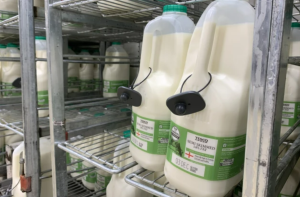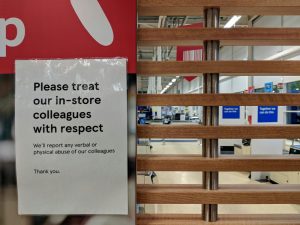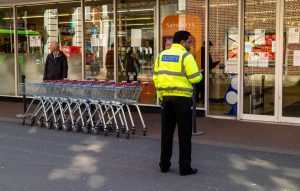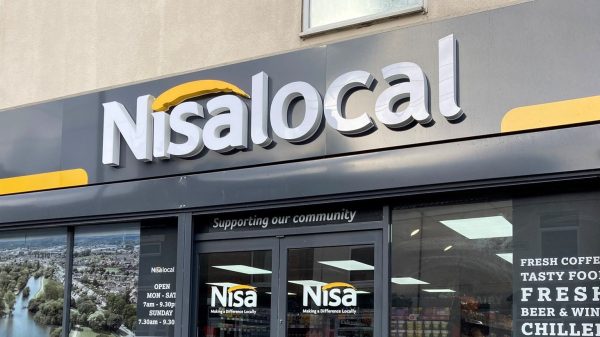Shoplifting and anti-social behaviour is out of control right now, according to supermarket bosses.
Recent data from the Co-op has revealed that there was more than 175,000 incidents at its in the first six months of 2023, equating to almost 1,000 retail crime incidents a day, up a whopping 35% year-on-year.
The surge is a result of repeat offenders and criminal gangs targeting stores all over the country, the convenience retailer said.
Across the wider retail industry, there were around eight million reported incidents of shoplifting in the 12 months to March 2023, according to the British Retail Consortium (BRC).
BRC director of business and regulations Tom Ironside says: “Shoplifting has risen by 27% in the past year across ten of the largest UK cities.
“These high levels of theft cost retailers almost £1bn in 2021/22, money that would be better used to reduce prices and invest in a better customer experience. To tackle this issue, retailers are spending hundreds of millions on security staff, CCTV, security tags, and other anti-crime measures.”
So, how can retailers tackle the shoplifting epidemic?
Subscribe to Grocery Gazette for free
Sign up here to get the latest grocery and food news each morning
What are retailers doing?
UK retailers have taken dramatic steps as of late in order to deter criminal behaviour.
For example, Sainsbury’s and Morrisons recently installed security exit barriers that prevent customers from leaving until they scan their receipt – something which shoppers have heavily criticised.
Tesco has resorted to putting security tags on low value items such as its milk and chicken ranges, and some Aldi stores have checkout staff looking in customer’s shopping bags to show its contents.

The Co-op now uses GPS tracked security tags on some items, and even ‘dummy’ packaging on shelves, which the retailer believes will become more prevalent in retailing.
Meanwhile, Waitrose has taken a somewhat gentler approach through the use of ‘love bombing’, which sees colleagues being extra attentive “causing thieves to think twice”.
Following a successful pilot carried out across six branches earlier this year, the training has now been rolled out across all branches. The aim is to make would-be thieves more conscious of shopworkers’ presence and therefore give them fewer opportunities to steal.
However, the upmarket grocer is also taking tougher measures, including rolling out body cameras across its stores.
Head of security for Waitrose owner John Lewis Partnership, Nicki Juniper says: “We’re taking a zero-tolerance approach to theft, not only to cut down on losses but, more importantly, to keep our Partners safe.
“We’ve increased the number of guards in our stores, and improved our CCTV, including the roll out of body-worn cameras across our shops.”
“Additionally, we’ve seen a great response to our ‘love bombing’, which deters would-be shoplifters by showing great customer service. We’ve also got a number of covert projects underway.”
But what strategies have proven effective in lowering retail crime rates?
A Waitrose spokesperson says: “A lot of our measures are trialled in a small number of stores, so that we can make sure they drive positive results, before we roll them out more widely for maximum effect.
“While there’s no silver bullet, using a range of tactics alongside one another is making an impact on tackling crime – especially when used across a business of our scale.”
“Not only are these measures cutting crime, they’re empowering our Partners and helping them feel safe and supported in their roles too.”
Colleague safety
Shoplifting is far from a victimless crime. It can have a long lasting impact on retail workers.
Over the past year, frontline store workers have seen physical assaults increase by 30%, while anti-social behaviour and verbal abuse has risen by 20%.
It’s an issue that The Co-op is determined to stamp out.

The convenience retailer successfully campaigned for stricter sentencing in law for violent incident against retail workers through its Safer Colleagues, Safer Communities campaign, with the new law introduced in Scotland in August 2021, and England and Wales the following May.
The convenience retailer has also invested more than £200m in recent years to improve colleague safety and has rolled out a wide range of targeted measures to deter criminal behaviour, including interactive and remote monitored CCTV and body-worn cameras
The body cameras have so far proven to be successful in not only lowering crime rates but making shop workers and service staff feel safer too.
Just last week, Tesco boss Ken Murphy described the impact on staff as heartbreaking, calling the assaults “an insult to shoppers and retail workers” and adding that “we cannot go on like this.”
The need for tougher police action
However, the crime wave continues. The Co-op gives the example of one inner city London store, which it says was “looted” three times in a single day.
The convenience store retailer warns that this out-of-control crime is unsustainable and could even see some communities become “a no-go area for local stores”.
Co-op Food managing director Matt Hood has called on the police to “play their part” in tackling retail crime.
Hood says that he has witnessed some “horrific incidents of brazen and violent theft” in stores, “where my store colleagues feel scared and threatened”.
“I see first-hand how this criminal behaviour also erodes the very fabric of our communities – it’s hard to over-emphasise how important urgent change is.
“Too often, the forces fail to respond to desperate calls by our store teams, and criminals are operating in communities without any fear of consequences.”
A Freedom of Information request by The Co-op recently found that police failed to respond to 71% of serious retail crimes reported.
The retailer has called on police forces and crime commissioners to target prolific offenders and local organised criminal gangs to reverse the environment in which they operate without fear of being caught or charged.
Where clear co-operation around this issue exists it is making a difference. The Co-op works closely with a number of forces, including Nottinghamshire police, who have been effective in tackling persistent and prolific offenders.
It partners with the National Business Crime Solution, which enables data sharing between the police, national crime agencies and businesses to help them identify offenders.
In Nottinghamshire this year, 17 prolific offenders have been removed off the streets, with a combined 5.6 years of custodial sentences, and a further 13 repeat offenders given a Criminal Behaviour Order (CBO) or rehabilitation.
Police Inspector Oliver Vale of the Nottinghamshire Police says: “Retail crime is something we recognise within Nottinghamshire Police as being an issue that needs to be proactively tackled, but we cannot do this alone and the information sharing model that…has developed has allowed for us to collaboratively secure significant convictions and prohibitive orders on some of our most prolific retail offenders by working with the Co-op.”
However, many forces seemingly turn a blind eye to retail crime.
John Lewis Partnership chair Dame Sharon White has called for tougher legislation to combat the rise in anti-social behaviour and crime.
She wants the legislation across the UK to match the stricter laws in Scotland.
White told Good Morning Britain this week: “The legislation is different in Scotland, so if you’re a shop worker and you’re abused and attacked, there’s a specific law that means it’s an offense.
“I think if we had the legislation we had in Scotland, where it is an offense to abuse retail workers, it would be a massive plus.
“I think it makes a massive difference knowing your local copper will be there and take it seriously.”

However, it’s not just about laws, it’s about enforcement.
Conservative MP for Shipley, and the chair of the All Party Parliamentary Group (APPG) on Customer Service Phillip Davies says: “It is no good having stricter laws in place to punish offenders if the police are not properly investigating these crimes and ensure perpetrators are punished.
“Those police forces with the worst record need to find out what those with the best record what they are doing and ensure they bring themselves up to the same standard.”
Retailers are playing their part but they can not tackle the wave of shoplifting alone.
Greater support is needed from police and politicians alike to stamp out the crime that is putting the industry’s frontline workers in danger.











1 Comment. Leave new
Chop their thieving hands off like they do in other countries!